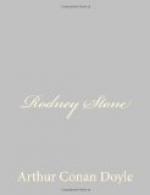“Your plight was better than mine, Sir Cuthbert,” said a voice from behind us, and a large man in the full uniform of a post-captain took a step forward to include himself in our circle. His mastiff face was heavy with emotion, and he shook his head miserably as he spoke.
“Yes, yes, Troubridge, I can understand and sympathize with your feelings.”
“I passed through torment that night, Collingwood. It left a mark on me that I shall never lose until I go over the ship’s side in a canvas cover. To have my beautiful Culloden laid on a sandbank just out of gunshot. To hear and see the fight the whole night through, and never to pull a lanyard or take the tompions out of my guns. Twice I opened my pistol-case to blow out my brains, and it was but the thought that Nelson might have a use for me that held me back.”
Collingwood shook the hand of the unfortunate captain.
“Admiral Nelson was not long in finding a use for you, Troubridge,” said he. “We have all heard of your siege of Capua, and how you ran up your ship’s guns without trenches or parallels, and fired point-blank through the embrasures.”
The melancholy cleared away from the massive face of the big seaman, and his deep laughter filled the room.
“I’m not clever enough or slow enough for their Z-Z fashions,” said he. “We got alongside and slapped it in through their port-holes until they struck their colours. But where have you been, Sir Cuthbert?”
“With my wife and my two little lasses at Morpeth in the North Country. I have but seen them this once in ten years, and it may be ten more, for all I know, ere I see them again. I have been doing good work for the fleet up yonder.”
“I had thought, sir, that it was inland,” said my father.
Collingwood took a little black bag out of his pocket and shook it.
“Inland it is,” said he, “and yet I have done good work for the fleet there. What do you suppose I hold in this bag?”
“Bullets,” said Troubridge.
“Something that a sailor needs even more than that,” answered the admiral, and turning it over he tilted a pile of acorns on to his palm. “I carry them with me in my country walks, and where I see a fruitful nook I thrust one deep with the end of my cane. My oak trees may fight those rascals over the water when I am long forgotten. Do you know, lieutenant, how many oaks go to make an eighty-gun ship?”
My father shook his head.
“Two thousand, no less. For every two-decked ship that carries the white ensign there is a grove the less in England. So how are our grandsons to beat the French if we do not give them the trees with which to build their ships?”
He replaced his bag in his pocket, and then, passing his arm through Troubridge’s, they went through the door together.




